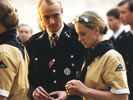Eye For Film >> Movies >> Spring Of Life (2000) Film Review
Based on Vladimir Körner’s novel, this Czechoslovakian Secondd World War drama spotlights the flip-side of the Nazi’s Final Solution – ie the Lebensborn project, in which they attempted to breed an Aryan master race by selecting the ‘purest’ female specimens from across the empire to be mated with high-ranking officers of the SS.
The story centres around Grétka (Monika Hilmerová), a beautiful blonde, physically ‘perfect’ Aryan girl from Czechoslovakia, chosen for the breeding programme on the strength of her strong lineage, perfect x-ray, and ideal head shape. Her initial examination offers a disturbing insight into the way in which the regime reduced human beings to the status of sheep or cattle, chosen along purely racial lines, according the Darwinian logic of survival, as the Nazis concerned themselves solely with the superficial qualities of physical appearance and inherited characteristics. The x-rays were conducted under the pretext of examining for the prevention of tuberculosis and the girls initially had no idea what fate lay in store for them, a fact which adds to the undercurrent of menace lurking beneath the film’s glossy surface.

Grétka is taken to the remote Isolde sanatorium near the Prussian lakes, an isolated location, far-removed from the horrors of war, a world where the emphasis is placed firmly on external beauty and appearance, on the superficial rather than what lies underneath, entirely in keeping with Nazi desires to create a race of ‘super-human’ physical specimens at the same time as they were committed to the horrific genocide of the Jewish race.
In this spirit of external appearances, our heroine adopts an outward expression of conformity with the regime, while inwardly (and indeed actively) rebelling against it, and refusing to succumb to the dehumanising principles upon which it is based. In this spirit of rebellion, she falls in love with Leo (Michal Sieczkowski), the Jewish son of the sanatorium’s former owners, whose continuing presence at Isolde is under threat from the authorities hostility.
Inevitable, but very apt, parallels are drawn between the externally incongruous worlds of the sanatorium and the concentration camp (with which the viewer is likely to be more familiar) as Grétka’s rebellion becomes more blatant and she begins to discover that, in spite of the privileged circumstances in which the girls are kept, Isolde is still every inch a prison and her freedom and choices are almost as restrictive as those of the inmates of the concentration camps.
The film is beautifully shot, well scripted and well produced, but somehow the climax, well executed as it is, didn’t quite have the power to move me as much as I feel the subject matter deserved. This is perhaps a consequence of the film’s polished, almost clinical exterior which, on some level, lessened the impact of the emotional response it elicits.
Reviewed on: 08 Sep 2009




















